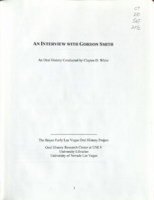Search the Special Collections and Archives Portal
Search Results
Reflections: the Las Vegas Asian American and Pacific Islander Oral History Project
No description.
Corporate Body

Transcript of interview with Gordon Smith by Claytee White, January 29, 2013
Date
Archival Collection
Description
Gordon Smith was born in Utah, but moved with his family to Babbitt, Nevada in 1947. His father, a barber, moved the family to Las Vegas in 1955. In this interview, Gordon recalls school and after-school pursuits; changes in the town; summer jobs; and college. He also talks about his military service and returning to Las Vegas to take up the razor himself - starting a successful barbering business of over 30 years.
Text

Transcript of interview with Rita Golub by Alisa Fife, March 14, 1981
Date
Archival Collection
Description
On March 14, 1981, Alisa Fife interviewed her friend’s grandmother, telephone operator and housewife, Rita Golub (born May 1st, 1920 in New York City, New York) in her home in Las Vegas, Nevada. The interview covers Rita Golub’s life in Las Vegas and includes discussion in regards to Queen Mother. Rita also discusses the Strip, night entertainment and social and religious activities in Las Vegas.
Text
Audio clip from interview with Rabbi Sanford Akselrad, October 29, 2014
Date
Archival Collection
Description
Rabbi Sanford Akselrad discusses Project Ezra, an employment program he established during the recession in conjunction with the Jewish Family Service Agency.
Sound

Transcript of interview with Agnes Gauger by Coleen Mancini, February 24, 1977
Date
Archival Collection
Description
On February 24, 1977, Coleen Mancini interviewed the claims manager for the Culinary Workers and Bartenders Insurance Fund, Agnes Gauger (born Coleen Evans on November 21, 1926 in Arkansas) in her home in Las Vegas, Nevada. Mrs. Gauger’s daughter, Traci Sturdivant was also present during the interview. This interview covers significant changes and growth in Southern Nevada, including gambling and other industries, family life and recreation, and early atomic tests. Mrs. Gauger also discusses housing in the Las Vegas, Howard Hughes, McCarran Airport, medical facilities and education in Southern Nevada.
Text

Transcript of interview with Nancy Horden by Ward Murashige, February 26, 1980
Date
Archival Collection
Description
On February 26, 1980, collector Ward Murashige interviewed Nancy Horden (born February 7th, 1921 in Las Vegas, Nevada) in James Dickenson Library at the University of Nevada, Las Vegas. The interview covers Nancy’s family background, and life in Nevada, including home life, recreation, and hobbies. During this interview, Nancy also discusses local development, and the social and environmental changes that have occurred over the span of her lifetime in Las Vegas, Nevada.
Text

Pete Barbutti interview, September 24, 2008: transcript
Date
Archival Collection
Description
Pete Barbutti (also spelled Barbuti) played the accordion, the piano, and the trumpet. He was also a comedian and appeared numerous times on the Tonight Show starring Johnny Carson and toured with Nat King Cole. He and his family have lived in Las Vegas since 1960
Text

Transcript of interview with Jackie MacFarlane by Claytee White, February 4, 2010
Date
Archival Collection
Description
Jacqueline "Jackie" Tilman MacFarlane was born in her grandmother's Las Vegas home at H Street and Clark Ave. Her father John Franklin Tilman was a construction worker at Boulder Dam (now Hoover) in early 1930s. Jackie recalls her family having to move several times the Great Depression and living in rural Nevada. Eventually the family came back to reside in Las Vegas. After graduating from high school, she took a waitress job at the Spot Cafe (Main & Charleston) and then at the Askew Drive-In. It was there that she met her future husband, David MacFarlane, an Air Force cadet. David continued to work at Nellis Air force Base as a civilian until he retired in 1987. Jackie describes raising her children in Fair Circle neighborhood during the 1950s and 1960s; a time when Las Vegas was just a "small town of 50,000." She felt safe and always found work in the casinos. Her work career included being a change girl at the Mint of Fremont St. and working as the front office cashier at the Desert Inn and then working at the Sands Hotel and Casino. Eventually she became a night auditor at Sands Hotel and Casino and then at Sahara Hotel and Casino from 1970-1977. She remembers working nightshift, coming home to get the kids and husband off to school and work. After leaving Sahara, she began selling Vanda cosmetics as a home business, something she still does today.
Text

Transcript of interview with Mary Kreuzer by Patricia Kohlman, December 15, 1975
Date
Archival Collection
Description
On December 15, 1975, Patricia Kohlman interviewed Mary Kreuzer (born 1923 in Las Vegas, Nevada) in her home in Las Vegas. The two discuss Kreuzer’s childhood, as well as the different addresses that she’s lived at in Las Vegas. The interview concludes with a discussion on entertainment and small businesses before the population boom in Southern Nevada.
Text

Transcript of interview with Louis F. La Porta by Stefani Evans and Claytee White, November 4, 2016
Date
Archival Collection
Description
Louis La Porta served on the City Council of Henderson, Nevada and the Board of Clark County, Nevada and oversaw periods of great growth. He was born in 1924 in New York City, but his service in the United States Air Force pulled him out West. After settling in Henderson, Nevada, with his wife Elayne, La Porta became interested in insurance sales and local politics. While in office, La Porta oversaw the development of critical roads for Clark County, the Henderson Historical Society, and Henderson Libraries. He recounts each of these major developments in his interview, chronicling the evolution of Henderson, Nevada, into a major city.
Text
